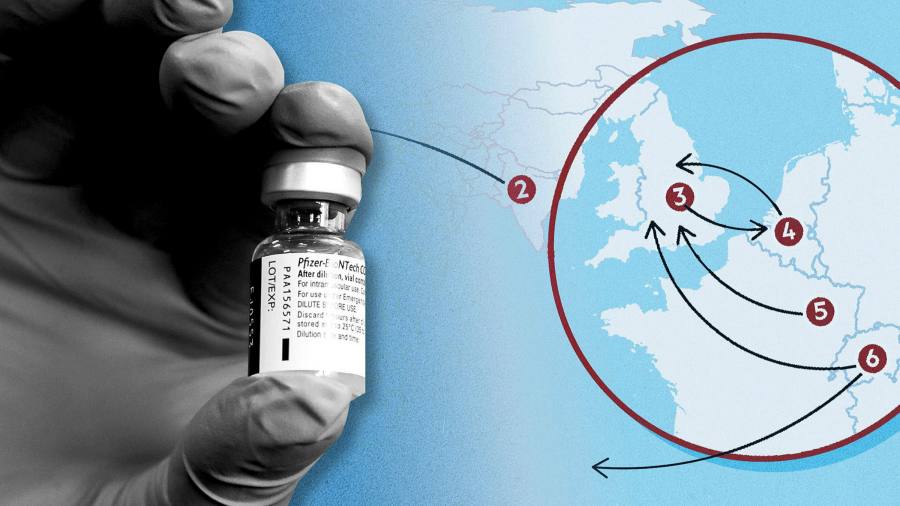[ad_1]
The EU’s threat to restrict the export of Covid-19 jabs has exposed the mutual harm that countries could inflict on one another due to the interdependent nature of the global vaccine supply chain.
Ursula von der Leyen, European Commission president, said on Wednesday that Brussels was considering “all options†to ensure Europeans were vaccinated as soon as possible.
Her plans, which are likely to be discussed at an EU summit next week, would stop vaccine shipments to countries that did not show “reciprocity†to the EU by allowing supplies to reach the bloc. But they are drawing fire from some observers, and even some member states, as a potentially self-defeating response.
The EU would be “taking a sledgehammer to something brittleâ€, risking retaliation and reputational damage for minimal gain, said Jacob Kirkegaard, senior fellow at the Peterson Institute for International Economics and the German Marshall Fund. “It’s an altogether bad political idea — and it fails to give Europe a material amount of extra vaccines now.â€
Many of the supply chains developed in the last six months to produce and distribute Covid-19 vaccines around the world are already intricately global. US biotech Moderna produces vaccine ingredient in Switzerland, fills and finishes the doses in Spain and ships from there to all buyers outside the US. Pfizer similarly has all of its non-US production situated inside the bloc.
Those EU facilities are in turn dependent on vaccine inputs — such as the lipid nanoparticles needed in mRNA vaccines and the plastic bags used in bioreactors — some of which are imported from the UK and the US.
Supply disruptions caused by export bans would only “prolong the crisis, add to our economic difficulties and lead to further loss of lifeâ€, warned Gavi, the UN-backed global vaccine alliance. One EU diplomat described it as “a political equaliser, not a solutionâ€.
The commission has yet to finalise how the new controls would work, but EU officials confirmed the move has been prompted by anger over the UK’s failure to export any finished vaccines to the EU at the same time as the bloc ships millions of doses of Pfizer jabs to Britain.Â
Von der Leyen did not disguise that the UK was one potential target, saying her remarks were “an invitation†to the country to show that vaccines could cross the Channel.Â
The commission won support from big member states including France and Italy when it floated the idea, diplomats said, but a number of nations have raised questions about the proposal, including the Netherlands, Belgium, Ireland and some Nordic countries. One diplomat warned that there was not yet a “critical mass of support†for the proposal.Â
“This is not about tit-for-tat, it is about the general principle of reciprocity,†said another EU diplomat. “Among member states there are those who are more vocal in supporting this idea, and others who are a little more hesitant.â€
Among the concerns are how to avoid triggering retaliation if the EU uses the restrictions against the UK, given the EU draws some inputs from Britain as part of the vaccine manufacturing process.Â
The UK is heavily reliant on EU production: the bloc has said it exported 10m vaccine doses to Britain between January 30 and March 16 alone. But there is also a flow of raw materials the other way that London could examine in retaliation. The lipid nanoparticles crucial to Pfizer’s pioneering mRNA vaccine come from the UK.Â
And the EU’s confrontation with the UK is not happening in a vacuum, with a risk that EU restrictions could provoke action from other countries, too. India, home of the world’s largest vaccine manufacturer, the Serum Institute, is set to be a major exporter of Covid-19 vaccines, but Indian executives have already complained that US export policy is restricting the flow of vaccine ingredients.
Tedros Adhanom Ghebreyesus, World Health Organization director-general, warned last week that restrictions on the export from some countries of “critical supplies†for vaccine production were already “putting lives at risk around the worldâ€.
The EU would need to make any tightening of its rules compliant with WTO standards, while reassuring allies around the world that it is not embarking on a rush to vaccine nationalism that undermines its broader reputation.Â
EU officials said the obvious way to carry out the threat would be to upgrade an export authorisation scheme for vaccines that Brussels unveiled earlier this year. The scheme has the aim of forcing suppliers, notably AstraZeneca, to honour their contracts with the EU.Â
The plan initially provoked diplomatic uproar over an ill-conceived move to trigger emergency Brexit provisions restricting trade with Northern Ireland — an idea that was quickly abandoned. But since then the scheme has functioned unobtrusively, with only one vaccine shipment blocked — an AstraZeneca delivery to Australia.
Brussels is exploring the option of amending the existing scheme to make it clear that reciprocity must be taken into account by national governments when reviewing export requests. The commission is also confident that its plans steer clear of potential violations of WTO rules.Â
However, trade lawyers stressed that while the EU had the right to block exports in a health emergency, any suggestion that it was singling out a destination like Britain for political reasons was liable to break international law. WTO rules generally prohibit outright export bans, but there are exceptions to ensure domestic supplies of critical goods, or to protect human life and health.Â
In the view of some capitals, the move risks backfiring. It would be an “overly defensive and ultimately counterproductive approachâ€, said an EU diplomat. “The focus should be on increasing production, which will only be hindered by further disruptions to global supply chains.â€
Reporting by Sam Fleming, Michael Peel, Jim Brunsden, Mehreen Khan and Alan Beattie in Brussels, and Hannah Kuchler in New York
[ad_2]
Source link







